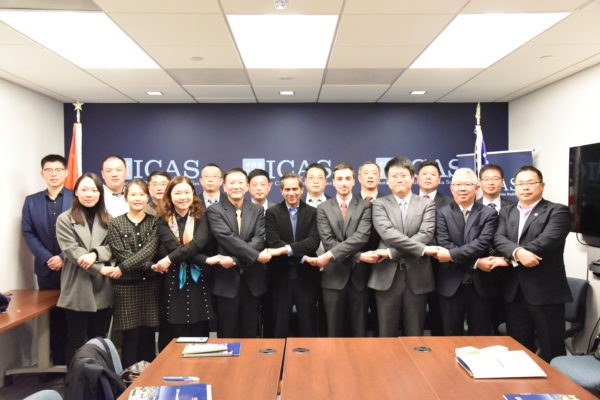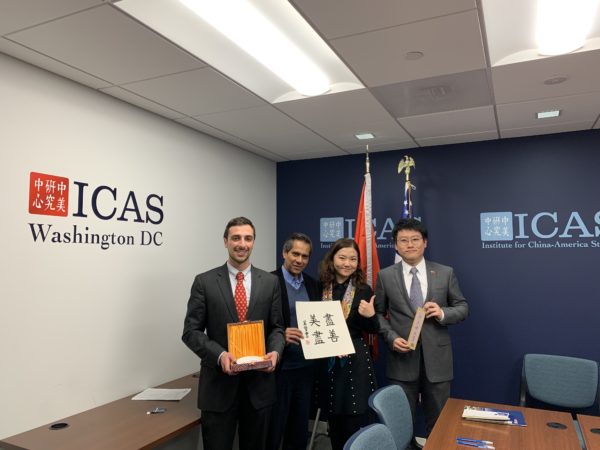
On December 5, a delegation from the Shanghai Economic and Information Technology Commission visited ICAS to discuss US-China economic ties, with a special focus on issues that might have led to the on-going trade war.
Within the past 20 months, US-China economic ties have deteriorated significantly. Two schools of thought were summarized which dictate how many in Washington view the trade frictions between the world’s two largest economies:
- Despite becoming a strong economic competitor of the United States, China continues to enjoy the international benefits of a developing country. However, many would like China to come on par – and be treated on par – with other advanced economies around the world. Proponents of this view stress the importance of China restructuring and modernizing its industrial structure and policies.
- In recent years, China has not only become a strategic competitor to the U.S., but also a strategic rival. Therefore, the trade war is only the beginning of a long-lasting competition between the two countries, and it is in the U.S. interest to use its current economic power to stop China in its tracks.

Additional perspectives on the causes of US-China trade friction were also introduced. During negotiations, China has made several promises, such as SOE reforms, IP improvements, and opening up investment opportunities for foreign firms. However, the U.S. has not witnessed the desired results, illustrating that these promises are not being fully honored The U.S. wishes to see tangible implementation-related actions related to Beijing’s announcement of relevant policy changes before it decides to begin gradually reducing tariffs.
Key Take-Aways:

Leveling the playing field for foreign investors:
- Many Chinese private companies and state-owned enterprises (SOEs) enjoy preferential backing by Beijing. Western nations hope to see rules set in place to restrain the role of the Chinese state as an actor in the world economy ensuring that international trade and investment ties happen on a fairer platform is essential.
- Western countries are urging change in China’s IPR-related domestic rules and the instituting of appropriate punishments for violators. These changes will create a friendlier environment for foreign companies to invest in Chinese sectors and license technology to firms.
The need to increase communication between the U.S. and China:
- The Chinese government’s political and economic structure is vastly different from that of the U.S. A deeper understanding of the Chinese side will aid U.S. policy makers to create more predictable policy towards China. It will also serve to lessen misperceptions between the two countries.
- China hopes to open-up its sectors to foreign investors; however, China would like to take the lead in managing the schedule of the opening-up process.
- China and the U.S. are not only economic competitors, but also competitors in other fields, such as technology and military. Thus, cross-sector and cross-domain communication is vital for future relations between the U.S. and China.
Looking ahead:
- Souring Western business sector attitudes towards China has plateaued and is actually improving. After the 19th National Congress of the Communist Party of China, the U.S. business community is noticing China’s efforts to open its markets to foreign investment.
- S. tariffs on Chinese products may be removed over time. The U.S. is unable to remove its tariffs until promises are kept and results are noticeable.
- Moving forward, U.S.-China relations could pivot towards issue-based cooperation. A key factor in this regard will be the results of the 2020 U.S. presidential election.


